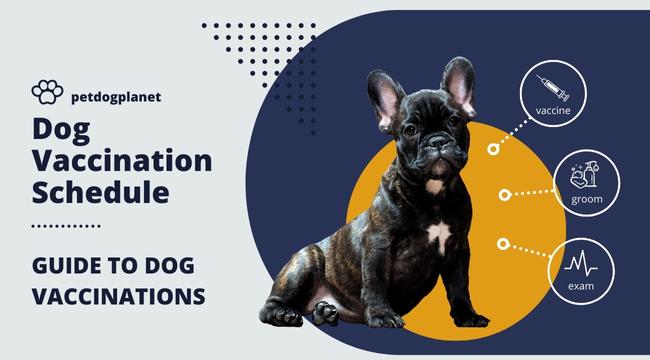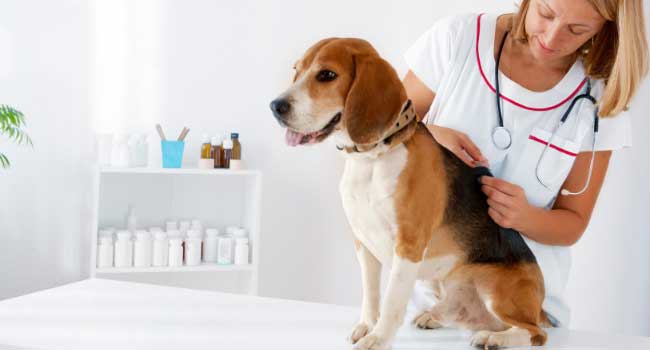
Are you looking for a dog vaccination schedule? If yes, you are in the right place. There are many options in vaccination schedules for your canine companion. As per the American Animal Hospital Association, the perfect canine vaccine schedule will mitigate the risk of serious illness in your dog. The vaccination schedule for your pup will depend on their age, weight, medical history, geographic location, and lifestyle.
When I adopted my first puppy, I was quite a fix in thinking whether I could be a good owner to this little furry bundle that was now dependent on me.
Read More:
- Immunization Schedule for Puppies
- Be a Step Ahead by Recognizing These Common Dog Diseases Symptoms
- Dog Food Allergies Symptoms, Testing, and Treatment
- Necessary Routine Care Tips For Dogs That You Shouldn’t Skip
- 4 Ways To Improve Your Dog’s Health And Immunity
The one thing that worried me most was her health—nutrition and vaccination.
As pet parents, it’s likely some of you have found this page because you’re worried about the same things.
Vaccinations are a major part of your dog’s health, so here is a guide to vaccinating your dog that hopefully answers most of the questions you have.
What are Vaccines Anyway?

The body’s immune system is designed to protect animal bodies from any form of foreign invasion—microorganisms that have the potential to cause disease. Still, sometimes, the immune system needs help. That’s where vaccines step in.
Vaccines are made from trace amounts of weak or dead microorganisms, which are known to cause disease. They are given to prepare your body to fight the diseases effectively and fast.
Why Dog Vaccination?
Vaccinating your dog is important because it will help protect them from harmful or even fatal diseases.
However, keep in mind: more is not always better—do not over-vaccinate your dog because that may lead to more serious consequences.
A specific schedule needs to be followed; not all dogs need all the vaccinations.
Diseases Your Dog Need to be Vaccinated Against:

Before we take an in-depth look at the types of vaccines, here are the top 7 diseases your dog may need to be vaccinated against.
1. Bordetella Bronchiseptica
Bordetella bronchiseptica is caused by bacteria and is characterized by coughing, vomiting, and even seizures.
2. Rabies:
Rabies is a disease that affects the central nervous system—it has severe adverse effects. Rabies in a dog leads to headaches, anxiety, hallucinations, paralysis, and often death.
Your pet may catch rabies if they are bitten by a rabid animal. The rabies vaccination is one of the core vaccines that must be given to your pet.
3. Parvovirus:
Puppies less than four months of age and unvaccinated dogs are at the highest risk of getting infected. Caused by the Parvo, the gastrointestinal system is attacked, and you will notice symptoms like fever, vomiting, and in extreme cases, bloody diarrhea.
Since it attacks the GI tract, your dog will be prone to dehydration which, if severe enough, can lead to death. If your dog displays these symptoms, get to the vet within 48 hours.
4. Canine Distemper:
Canine distemper is a deadly, contagious disease that spreads through the air—from an infected animal sneezing or coughing, affecting the respiratory system, the GI tract, and the nervous system. It can also be passed through shared things like food, water, bowls, etc.
Symptoms include fever, coughing, diarrhea, seizures, paralysis, and in some cases, ultimately leading to death. There is no specific cure for this one, and the treatment is continuous care until the immune system totally eradicates it from the body.
5. Kennel Cough:
It may be caused due to a number of viral or bacterial factors, including Bordetella and Canine Parainfluenza, which result in inflammation of the upper airways.
Symptoms include dry coughing, a loss of appetite, etc. It is usually a mild disease that can be kept in check and treated.
Read More:
6. Canine Hepatitis:
A viral infection affects the liver, lungs, kidneys, and even spleen, its symptoms include fever, jaundice, stomach enlargement, and pain around the liver. Though most dogs can easily overcome the disease at a mild stage, if it gets severe, it may lead to death.
7. Lyme Disease:
Lyme disease is a tick-borne illness caused by the bacteria spirochete. Once infected, a dog will start limping due to the swelling of lymph nodes, accompanied by a rise in temperature and loss of appetite.
Lyme disease can be fatal—it affects the kidneys, joints, heart, and, if untreated, ultimately the neurological system. Antibiotics are very helpful to treat this disease, though there is a high chance of a relapse years later.
Types of Vaccines:
Since we’ve looked at some of the diseases that can be prevented by vaccines, let’s look at the different types of vaccines and their schedules for puppies and adult dogs.
There are two major types of vaccines given to dogs: essential and situational (lifestyle) vaccines.
#1. Essential Vaccines
Essential vaccines are vaccines that are required by law; they’re essential for protection against severe contagious diseases.
1. Rabies Vaccine:
One of the main core vaccines is the rabies vaccine which—as the name suggests—offers protection against rabies.
Puppies are usually given the rabies vaccine between the ages of 12 to 16 weeks; this vaccine is later boostered over a span of 1-3 years, depending on the individual requirements of your dog’s breed. Later in the article, we will discuss the vaccination schedule of puppies.
2. Combination Vaccine:
The second core vaccine is a combination vaccine to protect against the distemper virus, parvovirus, and CAV-1.
Why does my dog need to be protected against viruses?
As we have already discussed before, these viruses are highly contagious; if your dog is affected by them, the consequences would be severe.
Keep in mind: in the USA and some provinces in Canada, rabies is the only vaccine that is legally required.
#2. Lifestyle Vaccines
With those two being the essential vaccines, there are other diseases against which vaccinations are available; however, they are situational vaccines and aren’t mandatory. Some of these vaccines include vaccinations against leptospirosis, Lyme, canine influenza, parainfluenza, etc.
Dog Vaccination Schedule for Puppies:

There are some generally accepted guidelines for puppy vaccinations—not all dogs are at risk of situational diseases.
However, here’s a general guideline you can take into consideration about your puppy’s vaccination schedule.
Puppies up to 6 weeks:
Usually, vaccines are not recommended for puppies up to 6 weeks old—except for special cases. Why? Well, newborn puppies get all their nutrition from the colostrum or (the milk of the mother), which is enriched with protective antibodies. This helps the puppy develop their own immune system.
Puppies 6-8 weeks old:
It is recommended to give puppies distemper and measles vaccine when they are 6-8 weeks old.
Puppies 10-12 weeks old:
A dose of DHPP (distemper, hepatitis, parainfluenza, and parvovirus) is recommended at 10-12 weeks.
Puppies 12-24 weeks old:
Rabies is recommended at the age of 12 to 24 weeks. When the rabies vaccine is given, make sure no other vaccine is given around the same time because the components of different vaccines may lead to adverse reactions.
A second dose of DHPP may be given at the age of 14 to 16 weeks and another dose of rabies and DHPP at 1 to 1 ½ years old.
Dog Vaccination Schedule for Adult Dogs:

Once your puppy has gotten all of their vaccines, the only other vaccine required by law is rabies, which should be done every 1-3 years.
Too many vaccines aren’t good for adult dogs; most owners opt for titer tests that measure the levels of antibodies to disease in your dog’s blood.
Unless and until required due to health reasons, no other vaccine is actually suggested for your dog. According to the American Animal Hospital Association, it was previously recommended that a dog should be given a vaccine every 3 years and, if possible, not so frequently.
Do Dogs Need To Get All Vaccines?
Well, in short, no.
Over-vaccinating, a dog, can have serious side effects, so make sure to be informed before visiting the vet. Don’t be afraid to ask your vet whether or not a vaccination is actually required or not.
Preparing For a Vet Visit:
To get the best possible care for your pet, before going to the vet, it is recommended to get prepared.
Some of the things you can do for your pet are:
- Understand your pet’s current state of health. Then, in accordance with that, decide for yourself whether or not it is actually necessary to vaccinate your dog at this point in time.
- Besides understanding your pet, you also need to conduct thorough research from various reputable sources to completely grasp the reasons why you should or should not vaccinate your dog.
- Consult with your vet about your dog’s health and take their previous vet records, health history, medications, and supplements to help get an accurate picture (both past and present information).
- If you are not comfortable with your vet’s suggestion, there’s nothing wrong with getting a second opinion!
Problems with Over Dog Vaccination:
Vaccine programs must be tailored to the specific needs of a dog. Over-vaccinating your dog, could make them prone to more diseases, which would do more harm than good.
According to pet expert Dr. Ronald Schlutz, some of the negative reactions of over-vaccinating have been classified as common, moderate, and severe.
Reactions to Over Vaccinating:
Common Reactions:
It includes lethargy, hair loss, loss of appetite, sneezing, and ulcers. These reactions are not potentially harmful.
Moderate Reactions:
It can be controlled, but they definitely cause more discomfort to your pet than common reactions. These include behavioral changes, lameness, respiratory disease, facial edema, weight loss, etc.
Alarming Reactions:
These are classified as severe—, they last a lifetime. They have mostly fatal consequences, the most extreme being death. Severe reactions include arthritis, abortion, seizures, failure to conceive, anemia, immune-mediated thrombocytopenia, etc.
So, How do I Decide What to Do?
#1. Take Your Dog for a Titer Test
Take a titer test to determine whether or not your dog needs the vaccine or not.
First things first, you may be thinking, “What is a titer test?” Well, any time the immune system is compromised, the “attack” is actually carried out by antigens—in other words, antigens are invaders.
In response to any antigens, the immune system recognizes the threat and produces antibodies to up the body’s protection.
A titer test will help determine the antibody to antigen ratio in your dog’s body.
A positive titer test means your dog has sufficient antibodies, and your dog is protected. This test is conducted as a blood test, which involves drawing blood.
#2. Understanding the Result of the Titer Test
If the result of your titer test is negative, it means that your dog’s immune system is not currently strong enough to protect itself from antigens; this is likely a good indication that it’s time to get a vaccination shot.
#3. Finally, Vaccinating Your Dog
First, consult the vet and get a complete wellness checkup to understand the current state of their natural immune system. Try to opt-out of combination vaccines, and make sure to keep the three-year time period in your mind unless the wellness exam shows otherwise.
Conclusion:
So, there you have it. There’s no such thing as the perfect dog vaccination plan; the decisions are totally up to you. You can always consult with not only your vet but also other pet experts to customize a vaccination program for your dog.
I mean, as dog parents, we believe in doing anything required for our pet-baby. So, it’s up to you to make the final decision depending on your dog’s lifestyle.
Keep an eye on their health, behavior and know their health history; being informed, you’ll be better equipped to make sure to give the core vaccines as necessary.




Thank you for sharing such an informative article about dog vaccinations. As a dog owner, I always worry about my furry friend’s health and well-being. It’s reassuring to know that vaccinations can help protect them from serious illnesses. I appreciate the emphasis on following a specific vaccination schedule based on my dog’s age, weight, medical history, location, and lifestyle. This helps ensure that my dog gets the appropriate vaccinations without over-vaccinating them. The article provides valuable information about the importance of vaccines and the diseases that my dog needs to be protected against. Thank you for helping me understand the significance of dog vaccinations!